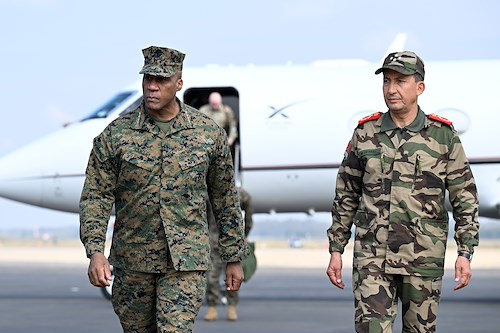United States Africa Command
Media Room
From the Media Room
Articles
Our latest news all in one place
Press Releases
Our official press releases
Images
Browse the latest images from AFRICOM and our partners
Documents
Factsheets, posture statements, and more
Niger Investigation
Read the special report here
Transcripts
Catch up on speeches from our leaders both past and present
MISO
Military Information Support Operations
News by Section
Special Links
About the Command
Directorates and Staff
J1 - Manpower and Personnel
J2 - Intelligence
J3 - Operations
J4 - Logistics
J5 - Strategy, Engagement and Programs
J6 - C4S Systems
J8 - Resources and Assessments
Headquarters Commandant
Office of the Command Chaplain
Office of the Command Surgeon
Office of the Foreign Policy Advisor
Office of the Legal Counsel
Office of the Inspector General
Office of Public Affairs and Communication Synchronization
Interagency Staff
2025 Posture Statement to Congress
2024 Posture Statement to Congress
2023 Posture Statement to Congress
2022 Posture Statement to Congress
2021 Posture Statement to Congress
2020 Posture Statement to Congress
2019 Posture Statement to Congress
2018 Posture Statement to Congress
History of U.S. Africa Command
Staff Resources
Office of Security Cooperation in-processing
AFRICOM Portal
ATAAPS
Guard & Reserve
Theater Medical Clearance
Network Account Creation
Operational Contract Support
OPSEC Hub
Research
Travel to Africa
AFRICOM Mission Partner Environment (AMPE)
Useful Links
Veterans/Military Crisis Line (VCL/MCL)
Sexual Harassment/Assault Response Prevention























